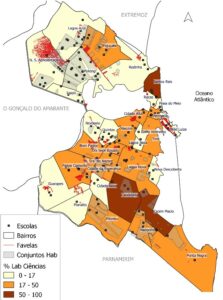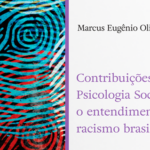Sandra Gomes, Professor at the Department of Public Policy, University of Rio Grande do Norte (UFRN), Natal, RN, Brazil.
Francymonni Yasmim Marques de Melo, Bachelor in Public Policy Management and Masters in Urban and Regional Studies, Natal, RN, Brazil

Proportion of state and municipal schools with a Science Lab by neighborhood in the city of Natal, Brazil, 2017. Obs: black dots are public schools. Red lines show the location of “favelas” (shantytowns) and in grey location of public housing. Image: GOMES; MELO, 2021.
One of the most intense issue debated in Brazil is the low level of educational performance of students from public or state schools. Some people argue that the problem refers to a lack of priority for education in government agenda or the lack of interest of politicians or the low wages of Brazilian teachers. Although these points can be sometimes be admissible and the case, from the point of view of academic studies is quite a consensus that the main factor affecting student performance is socioeconomic conditions. In other words, coming from a family who lives under a situation of social vulnerability, maybe with parents who themselves did not attend school, food insecurity conditions (such as hunger) and other adversities all have the potential of producing negative effects on learning abilities of students.
If these studies confirm the role of these social inherited adverse conditions on school performance, what can be done by public officials? Imagine the following situation before we answer this question. If all Brazilian students, in any school in the country, received exactly the same teaching tools and equipment, would this be enough to eliminate education inequalities?
To think about this, we present “two proposals”. The first one is known as “equality principle” in which we have an equal distribution to all. The second one is called “equity principle” which means to give priority to individuals who are in social disadvantage positions. The latter would function as a tool to correct original inequalities – namely, those that depend on the “fortune” of your place of birth -, in order to achieve in fact equality.
The first proposal of pure equality would not be sufficient as there is a significant part of Brazilian students in such a disadvantageous situation that in order to be in an equal situation in comparison to the rest of pupils – especially comparing to private attending students – would have to receive a different and priority treatment. As strange as it may seem at first sight, it is a different treatment to those individuals which can generate an effective equality for all.
These and other topics are dealt with in the article “For a spatial approach to managing education policies: equity to overcome inequalities” published by the journal Educação & Sociedade (vol. 42).
In the case study of the city capital of Natal, in the State of Rio Grande do Norte, in the North-eastern region of Brazil, it was observed that neither the equality nor the equity principles were adopted by local educational officials from both state and municipal schools. To illustrate with only one example (other examples can be accessed in the full article), secondary public schools that had a science laboratory were few: 24,5% of total public schools. The distribution of this equipment is also very unequal, even if one considers schools from within the same network system (state or municipal schools). In the case of North and West administrative regions of the city – neighbourhoods that present a higher concentration of families in social vulnerable situation – a school to have a science lab is rare (see image below). Given what the above studies conclude, it would be precisely these pupils in social vulnerability who would benefit more, in relative terms, from having a school better equipped and, in theory, more attractive to trigger scientific curiosity and general knowledge.
In this sense, the article puts forward the idea that official managers of education policies do not seem to adopt principles to correct social origins’ inequalities, although they should. For the authors, this is not a minor discussion as there are many implications from this practice, not only in terms of social justice but also for the future of the country. If one believes that schools have an enormous potential to develop diverse abilities in individuals, then, it also possible to envision the transformation of students as future citizens able to think, imagine, being aware of their rights as well as qualified professionals and creative people that could generate technological, scientific, and social innovation for the benefit of society and the country. As an important step towards this end, it is the approval, by National Congress, of a new fund for education in the country – known as FUNDEB – which adopts, for the first time, equity principles in the distribution of part of the financial resources to public education which may be a positive incentive for public officials to adopt principles of fairness and equity in planning education policies and, hopefully, improving educational performance and the fairness of society in general.
Next, watch the video of Sandra Gomes discussing how to overcome educational inequalities in Brazil.
References
DUBET, F. et al. As desigualdades escolares antes e depois da escola: organização escolar e influência dos diplomas. Sociologias [online]. 2012, vol. 14, no. 29, pp. 22-70. ISSN: 1517-4522 [viewed 18 December 2020]. https://doi.org/10.1590/S1517-45222012000100003. Available from: http://ref.scielo.org/s4f7bt
RIBEIRO, L. C. Q., et al. Desafios urbanos à democratização do acesso às oportunidades educacionais nas metrópoles brasileiras. Educ. Soc. [online]. 2016, vol. 37, no. 134, pp. 171-193. ISSN: 1678-4626 [viewed 18 December 2020]. https://doi.org/10.1590/ES0101-73302016157093. Available from: http://ref.scielo.org/26hqxz
To read the articles, acess
GOMES, S. et al. Por uma abordagem espacial na gestão de políticas educacionais: equidade para superar desigualdades. Educ. Soc. [online]. 2021, vol. 42, e234175. ISSN: 1678-4626 [viewed 18 January 2021]. https://doi.org/10.1590/es.234175. Available from: http://ref.scielo.org/6g2hgm
External links
Academia.edu: https://unicamp.academia.edu/EducaçãoeSociedade
Educação e Sociedade – ES: www.scielo.br/es
Facebook: https://www.facebook.com/ES.cedes/
LinkedIn: www.linkedin.com/in/educação-e-sociedade
Mendeley: https://www.mendeley.com/profiles/educao-e-sociedade/
Twitter: https://twitter.com/ES_cedes
Como citar este post [ISO 690/2010]:


















Recent Comments